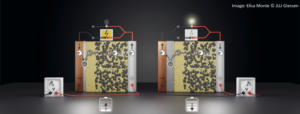Summary:
You may already have heard a lot about solid-state lithium-ion batteries (SSB). They are considered an alternative to liquid-electrolyte-based lithium-ion batteries due to many claimed advantages. These claims motivate researchers from academia and industry from all around the globe, which makes SSBs a highly dynamic field.
But which kind of safety is referred to when claiming that SSBs are safer compared to liquid-electrolyte-based lithium-ion batteries? Are SSBs able to provide improved energy/power density, specific charge (capacity), and cycle lifetime? Which materials are required for high performance and which allow a cheap production at a large scale? How can these materials be handled and how are they modified to properly work in an SSB?
The concept of “solid-state” provides plenty of opportunities for new materials, new synthesis and production routes, and new concepts on the cell level. This variety makes the field a highly dynamic and complex one and the contributions originating from the German industry are small compared to international activities. To concentrate the relevant competencies and experiences available in German research institutions and to be able to consult the German industry about SSBs properly, the Federal Ministry of Education and Research (BMBF) funded the FestBatt Cluster of Competence for Solid-State Batteries.
Within this cluster, more than 100 scientists from 23 research groups working at 12 research sites in Germany are equipped with funding of more than 25 million EUR to support the German industry in making decisions. This requires knowledge of international activities, identification of challenges, and development of solutions. While many questions can well be answered on the lab scale, also challenges in upscaling, e.g., material syntheses and production are tackled, and solutions are developed.
This conference contribution intends to provide a comprehensive overview of the large, complex, and dynamic field of SSBs. It may well serve as a beginning of consulting about the current state-of-the-art, challenges, and opportunities for companies with or without experiences in the battery field. Very individual and specialized production processes may become relevant at a certain stage along the whole economic value chain.
So, let’s talk about the experiences and competencies that are known to be relevant now and those, which may become promising in the near future.
We are happy to forward your request / feedback.

